Monterey State Historic Park, Monterey
Cannery Row and the harbour have sacrificed much of their history to serve the tourist trade, but there are old buildings in Monterey. Monterey State Historic Park has been set up to preserve the old buildings, many of which date back to the days of Mexican rule and when Monterey was the capital of California. The preserved buildings include the Custom House which has been restored to its 1840s look. This is where in 1846 the US flag was first raised over California by Commodore John Drake Sloat. Not far away is an adobe building that was built as a lodging house in 1846-7 but in 1850 became the first theatre in California. Click Tab 2 to see California's first theatre.
The Lone Cypress, 17 Mile Drive
The 17 mile drive takes you round the scenic western and southern coasts of the peninsula. It passes through the town of Pacific Grove and Pebble Beach, which is primarily a golf resort. The route is owned by the Pebble Beach corporation and they charge a toll for driving the road. The lone cypress is the best known view on the 17 mile drive.
Cannery Row, Monterey
The seas around here used to be brimming with fish, and in 1902 the first cannery opened in Monterey. Within a few years numerous canneries had been built on the waterfront creating Cannery Row and making Monterey a world centre for sardine canning. By the mid 1950s over fishing resulted in fast declining catches and Monterey canneries went out of business. Many of the cannery buildings have gone, and those that remain have been converted into tourist shopping centres offering souvenirs, fast food and wine tasting. This picture shows one of the bridges over Cannery Row that was used to move the filled cans from the processing plant on the bay side of the street to the warehouses on the other side of the street.
Monterey Harbour & Municipal Wharf No2 from Coast Guard Pier
Monterey still has a busy harbour, but nowadays leisure craft far outnumber fishing boats. Tourism and leisure now dominate this part of Monterey and an old wharf that was once a fish market has now been developed into a ‘Fisherman’s Wharf’ with tourist shops and restaurants. It is not just humans who come here for a bit of rest, sea lions have taken over the end of one of the harbour piers. Click Tab 2 to see a picture of sea lions at leisure on the end of Coast Guard Pier.
Monterey Peninsula
The peninsula that juts out into the Pacific Ocean at the southern end of Monterey Bay forms a dividing line between the developed coast that runs down from San Francisco and the wild Big Sur coast that continues southwards. On the peninsula stands the city of Monterey which was founded by the Spanish in 1770 and was capital of California from 1777 to 1849. After Mexico won independence from Spain in 1822, Monterey boomed as the main port of entry to California. Many will feel that they know the city from John Steinbeck novels such as Tortilla Flat written in 1935, Cannery Row (1945) and Sweet Thursday (1954). But if you visit expecting to discover the feel of the Steinbeck novels you will be disappointed as Monterey is now a bustling tourist town of over 30,000 people and the canneries have long gone.
DLU070313
Click on Minimap to navigate
Home > US States > The West > California > Californian Coast >
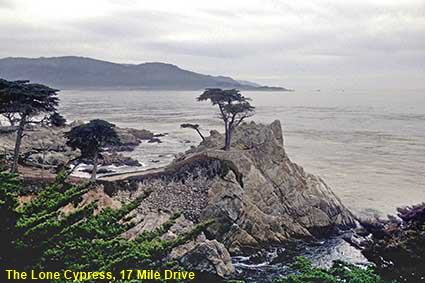
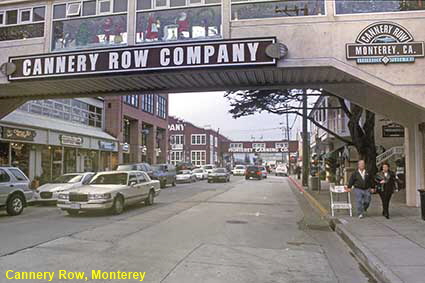
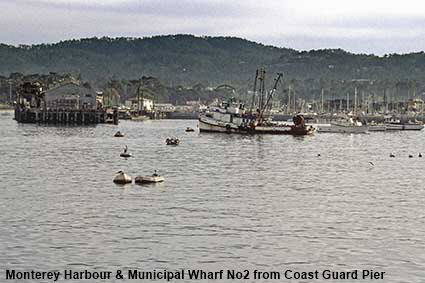
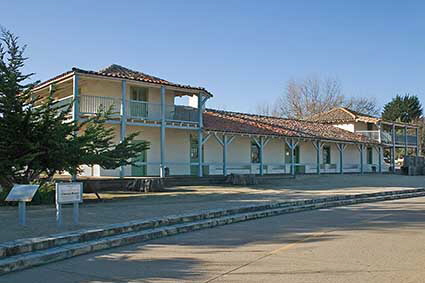
Beach at Carmel
Located at the southern end of the Monterey Peninsula, Carmel is probably best known for its posh and expensive shops and for former mayor Clint Eastwood. There is more to Carmel than that. It has a great beach and an old Spanish mission which is included in the Californian Missions page. Carmel is also the gateway to Big Sur, and this picture of the beach is looking south towards the Big Sur coast.
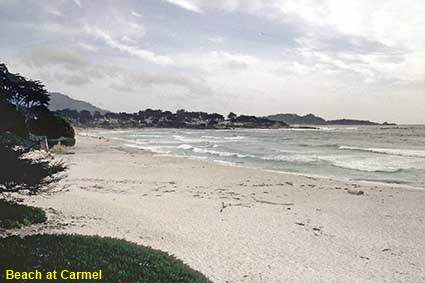


To move forwards or backwards through the California Coast trail click the arrows above, or select your next destination on the Minimap.
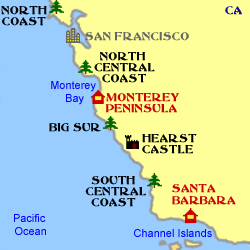

© Mike Elsden 1981 - 2025
The contents of this page may not be reproduced in full or in part without permission